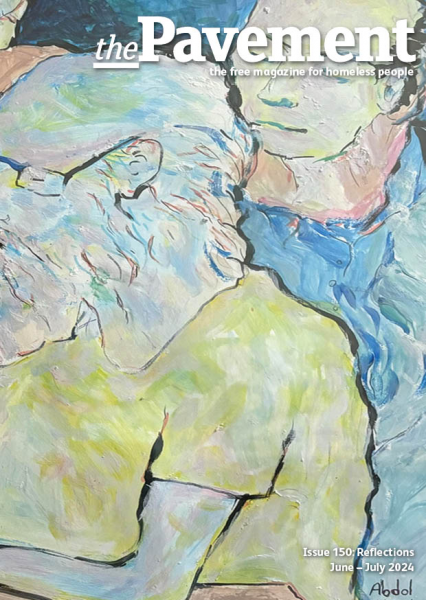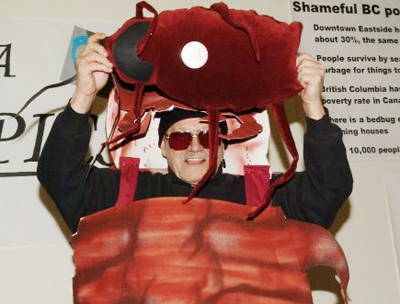
Established 2005 Registered Charity No. 1110656
Scottish Charity Register No. SC043760
DONATE
RECENT TWEETS
The Assistance to Shelter Act, passed at the beginning of December 2009, allows police forces in the city to "assist homeless people to shelter during extreme weather conditions". Civil liberties campaigners and homeless groups have nicknamed it ‘The Olympic Kidnapping Act', alleging that Vancouver's government passed the law as a means of forcing homeless people off the streets before the international focus of the Winter Games is upon it.
"This Kidnapping Act creates a state of fear in the downtown Eastside," says Stella August, a member of a community group in one of the most poverty-hit areas of Vancouver. "We are angered at the hypocrisy of a government that closes down emergency shelters, while allowing police to forcefully displace homeless people against their will. We have already witnessed waves of police crackdowns over the past year, and we are not foolish enough to believe that this is a coincidence leading up to the games."
The city's government passed the law in response to the death in December 2008 of a homeless woman whose shopping-trolley shelter caught fire. The case of Dawn Bergman, known by others on the street as ‘Tracey', shocked many people in the region and increased pressure on Vancouver's politicians to take action on the city's homelessness crisis. Under the Assistance to Shelter Act, police can prevent people from trying to stay outside during Vancouver's coldest periods, when temperatures can drop as low as -10 degrees Celsius.
Canada's Housing and Social Development Minister Rich Coleman, speaking on the day the legislation was passed, explained: "When an extreme weather alert has been issued, we want people at risk off the streets and into safe accommodation. What we want to do is show people the supports available to them, including a warm bed and a hot meal."
But critics have argued that the government has manipulated Tracey's high-profile death in order to force through an unconstitutional law. "This legislation represents a return to the vagrancy laws of the 19th century, which saw people criminalised simply for being poor and having nowhere to go," says Laura Track, Housing Campaign Lawyer for Vancouver firm PIVOT. "The minister knows this is an unconstitutional law; this is a cynical strategy by the Liberal government to force poor people off the streets for the Olympics before courts strike the legislation down, which will, unfortunately, take months if not years."
"This is not the first time an Olympic host has resorted to using police to force homeless people out of sight," Track adds. "As a city and a province, we should all be truly disappointed to see the Vancouver 2010 Olympics going exactly the same way."
In order to draw attention to the homeless situation in the city, campaigners have organised a ‘Poverty Olympics' to be held in Vancouver five days before the beginning of the official games. With events like ‘Skating (Around Poverty)' and with mascots including Creepy the Cockroach and Chewy the Rat, the event is aiming to embarrass the government over its failed housing policy, at a time when the world's eyes will be on the city. Organisers have criticised the government for cutting the budget on social services, legal aid and healthcare while spending increasing amounts of money on Olympic-related projects.
The Poverty Olympics' Organising Committee released a statement to reporters saying that: "Grinding poverty and growing homelessness are happening despite some bold promises to create a positive Olympic legacy - promises such as building more social housing, reducing homelessness, and not displacing poor people to make way for Olympics-driven development."
Official figures show that more than 2,500 homeless people live on the streets of Vancouver, a figure that has increased by 300 per cent in the last decade.
As increasing numbers of rough sleepers are forced off the streets, Vancouver's shelters are reaching critical capacity, and even emergency overflow hostels are being forced to turn people away.
The local government is opening two new emergency shelters in the weeks before the Olympics start in a bid to deal with the larger numbers of people forced into hostels as the Assistance to Shelter Act starts to impact on rough sleepers in the city.
"We're seeing just how big the demand is for shelter and housing in our city," says the city's mayor Gregor Robertson. "It's not just the Downtown Eastside that needs housing - it's neighbourhoods across Vancouver."
June – July 2024 : Reflections
CONTENTS
BACK ISSUES
- Issue 150 : June – July 2024 : Reflections
- Issue 149 : April – May 2024 : Compassion
- Issue 148 : February – March 2024 : The little things
- Issue 147 : December 2023 – January 2024 : Next steps
- Issue 146 : October 2023 – November 2023 : Kind acts
- Issue 145 : August 2023 – September 2023 : Mental health
- Issue 144 : June 2023 – July 2023 : Community
- Issue 143 : April 2023 - May 2023 : Hope springs
- Issue 142 : February 2023 - March 2023 : New Beginnings
- Issue 141 : December 2022 - January 2023 : Winter Homeless
- Issue 140 : October - November 2022 : Resolve
- Issue 139 : August - September 2022 : Creativity
- Issue 138 : June - July 2022 : Practical advice
- Issue 137 : April - May 2022 : Connection
- Issue 136 : February - March 2022 : RESPECT
- Issue 135 : Dec 2021 - Jan 2022 : OPPORTUNITY
- Issue 134 : September-October 2021 : Losses and gains
- Issue 133 : July-August 2021 : Know Your Rights
- Issue 132 : May-June 2021 : Access to Healthcare
- Issue 131 : Mar-Apr 2021 : SOLUTIONS
- Issue 130 : Jan-Feb 2021 : CHANGE
- Issue 129 : Nov-Dec 2020 : UNBELIEVABLE
- Issue 128 : Sep-Oct 2020 : COPING
- Issue 127 : Jul-Aug 2020 : HOPE
- Issue 126 : Health & Wellbeing in a Crisis
- Issue 125 : Mar-Apr 2020 : MOVING ON
- Issue 124 : Jan-Feb 2020 : STREET FOOD
- Issue 123 : Nov-Dec 2019 : HOSTELS
- Issue 122 : Sep 2019 : DEATH ON THE STREETS
- Issue 121 : July-Aug 2019 : INVISIBLE YOUTH
- Issue 120 : May-June 2019 : RECOVERY
- Issue 119 : Mar-Apr 2019 : WELLBEING
- Issue 118 : Jan-Feb 2019 : WORKING HOMELESS
- Issue 117 : Nov-Dec 2018 : HER STORY
- Issue 116 : Sept-Oct 2018 : TOILET TALK
- Issue 115 : July-Aug 2018 : HIDDEN HOMELESS
- Issue 114 : May-Jun 2018 : REBUILD YOUR LIFE
- Issue 113 : Mar–Apr 2018 : REMEMBRANCE
- Issue 112 : Jan-Feb 2018
- Issue 111 : Nov-Dec 2017
- Issue 110 : Sept-Oct 2017
- Issue 109 : July-Aug 2017
- Issue 108 : Apr-May 2017
- Issue 107 : Feb-Mar 2017
- Issue 106 : Dec 2016 - Jan 2017
- Issue 105 : Oct-Nov 2016
- Issue 104 : Aug-Sept 2016
- Issue 103 : May-June 2016
- Issue 102 : Mar-Apr 2016
- Issue 101 : Jan-Feb 2016
- Issue 100 : Nov-Dec 2015
- Issue 99 : Sept-Oct 2015
- Issue 98 : July-Aug 2015
- Issue 97 : May-Jun 2015
- Issue 96 : April 2015 [Mini Issue]
- Issue 95 : March 2015
- Issue 94 : February 2015
- Issue 93 : December 2014
- Issue 92 : November 2014
- Issue 91 : October 2014
- Issue 90 : September 2014
- Issue 89 : July 2014
- Issue 88 : June 2014
- Issue 87 : May 2014
- Issue 86 : April 2014
- Issue 85 : March 2014
- Issue 84 : February 2014
- Issue 83 : December 2013
- Issue 82 : November 2013
- Issue 81 : October 2013
- Issue 80 : September 2013
- Issue 79 : June 2013
- Issue 78 : 78
- Issue 77 : 77
- Issue 76 : 76
- Issue 75 : 75
- Issue 74 : 74
- Issue 73 : 73
- Issue 72 : 72
- Issue 71 : 71
- Issue 70 : 70
- Issue 69 : 69
- Issue 68 : 68
- Issue 67 : 67
- Issue 66 : 66
- Issue 65 : 65
- Issue 64 : 64
- Issue 63 : 63
- Issue 62 : 62
- Issue 61 : 61
- Issue 60 : 60
- Issue 59 : 59
- Issue 58 : 58
- Issue 57 : 57
- Issue 56 : 56
- Issue 56 : 56
- Issue 55 : 55
- Issue 54 : 54
- Issue 53 : 53
- Issue 52 : 52
- Issue 51 : 51
- Issue 50 : 50
- Issue 49 : 49
- Issue 48 : 48
- Issue 47 : 47
- Issue 46 : 46
- Issue 45 : 45
- Issue 44 : 44
- Issue 43 : 43
- Issue 42 : 42
- Issue 5 : 05
- Issue 4 : 04
- Issue 2 : 02
- Issue 1 : 01
- Issue 41 : 41
- Issue 40 : 40
- Issue 39 : 39
- Issue 38 : 38
- Issue 37 : 37
- Issue 36 : 36
- Issue 35 : 35
- Issue 34 : 34
- Issue 33 : 33
- Issue 10 : 10
- Issue 9 : 09
- Issue 6 : 06
- Issue 3 : 03
- Issue 32 : 32
- Issue 31 : 31
- Issue 30 : 30
- Issue 29 : 29
- Issue 11 : 11
- Issue 12 : 12
- Issue 13 : 13
- Issue 14 : 14
- Issue 15 : 15
- Issue 16 : 16
- Issue 17 : 17
- Issue 18 : 18
- Issue 19 : 19
- Issue 20 : 20
- Issue 21 : 21
- Issue 22 : 22
- Issue 23 : 23
- Issue 24 : 24
- Issue 25 : 25
- Issue 8 : 08
- Issue 7 : 07
- Issue 26 : 26
- Issue 27 : 27
- Issue 28 : 28
- Issue 1 : 01

